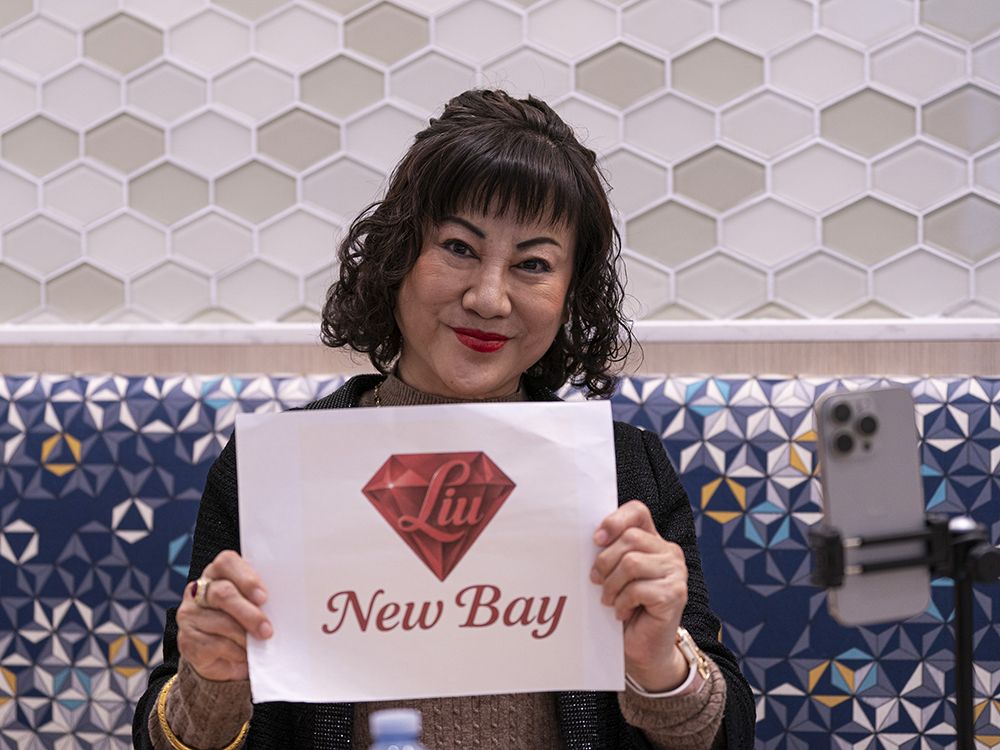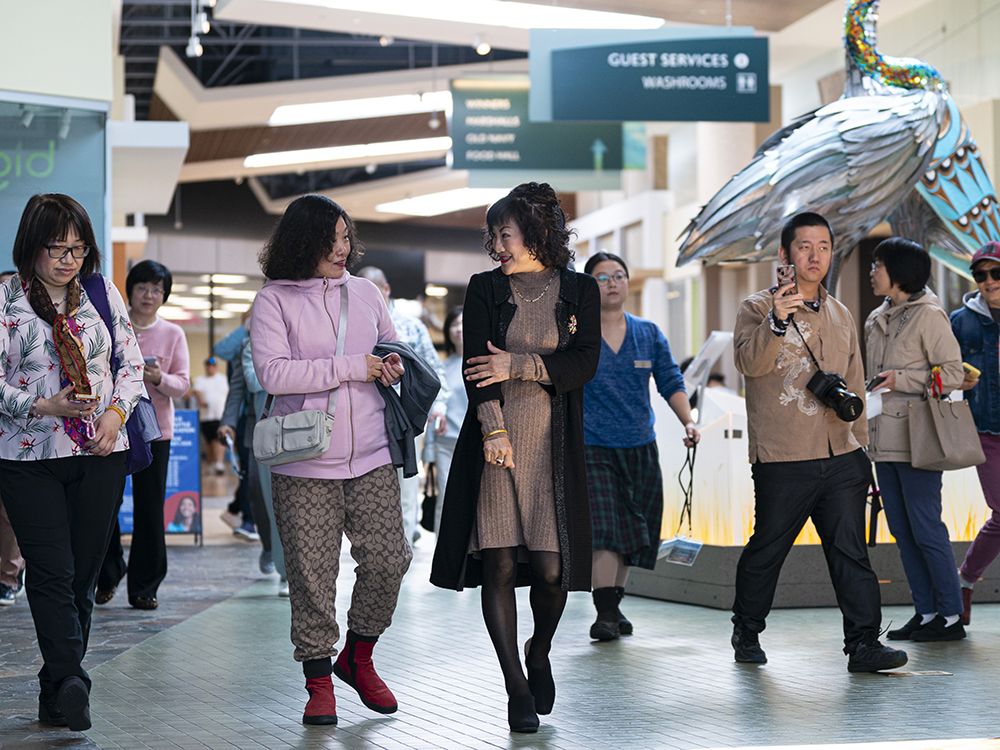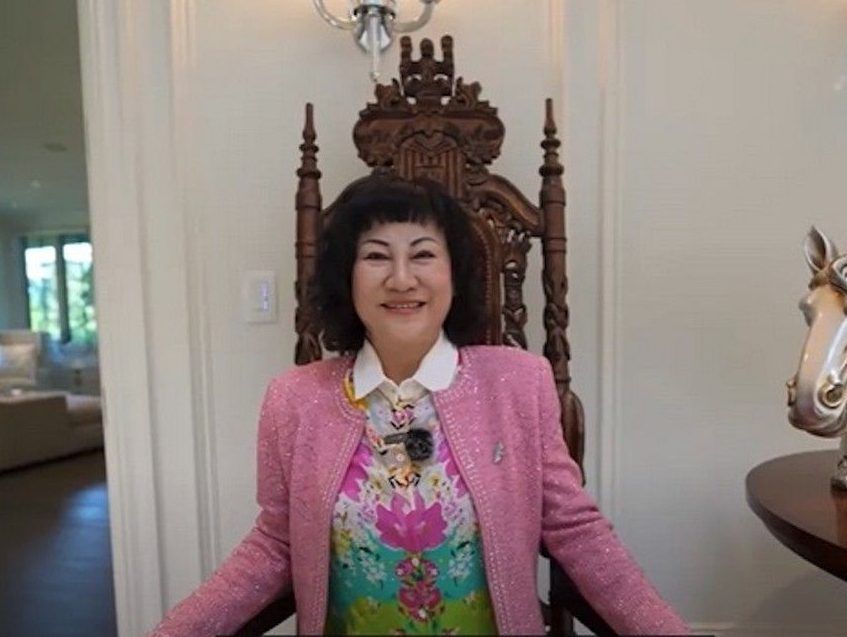
On a recent weekend in Metro Vancouver, shoppers, spectators and stage parents alike flocked to Tsawwassen Mills shopping mall where there was a children’s modelling contest.
The event, held near one of the sprawling, suburban mall’s many entrances, would see young competitors strut their stuff down a makeshift runway for the chance to compete in the finals, held in Hangzhou, China later this summer.
But from across the crowd, it was easy to spot Ruby Weihong Liu coming into the mall, sparkling runway or not.
Liu boasts frenetic, boss lady energy, sweeping in and waving hello to influencers snapping photos, while others had no idea a reported billionaire entrepreneur was in their midst.
Liu is the founder of Central Walk, the B.C.-based real estate investment firm which bought Tsawwassen Mills in 2022, and has been capturing attention for her quirky Chinese-language social media posts about wanting to transform the assets of Canada’s oldest retailer, Hudson’s Bay.
As Hudson’s Bay goes through creditor protection proceedings, Central Walk’s bid is among those from 12 parties seeking to acquire a total of 39 leases.

On the same day in mid-May that Hudson’s Bay Co. gave a timeline of between early to mid-June for when it will decide on a buyer or buyers for its assets, Liu’s team invited Postmedia to cover the modelling event and hear more about her plans even though they emphasized she can’t say much about their actual bidding process.
It’s hard to know what to make of Central Walk’s bid for Hudson’s Bay leases, whether it’s an interesting, but long shot or blowing into the wind.
“I can only say we are in the final stages of finalizing everything. We have our own legal counsel talking to the (court) monitor, the Bay’s counsel, and everybody is working very hard together and going through the last stage of the bidding procedure,” said Liu in Mandarin.
While Liu wouldn’t share the details of her bid, she’s made it no secret that she plans to open a chain of more than 20 retail stores across Canada with locations in B.C., Alberta and Ontario. It appears that Hudson’s Bay leases, if Liu is successful with her bid, could be the crown jewel in her retail empire.
On the day of the modelling contest, Liu shared with her social media followers and Postmedia a potential design for a logo she might use for this business plan. The logo is a play on her English name, Ruby, and features a big, pink jewel at the top.
The placeholder design is marked with her name inside the jewel and beneath that, “A New Bay.”
“It’s ‘Ruby Liu: A New Bay,'” she explained, while chirping quick instructions to her executives and staff, who followed her every move and helped with translation from Mandarin to English.
The timing was only a few days after Canadian Tire Corp. Ltd. said it will buy the rights for using Hudson’s Bay iconic stripe design, coat of arms, brand names and other intellectual property for $30 million.
In making the announcement, Canadian Tire president and CEO Greg Hicks said in a statement that the two companies are “among the nation’s longest-standing companies with a combined Canadian heritage measured in centuries. Some things are just meant to stay Canadian and we are honoured to welcome many of HBC’s leading brands.”
Liu told Postmedia that Central Walk had also bid for Hudson’s Bay intellectual property.
“We wanted to buy this as well. But Canadian Tire is a giant company with deep pockets and we are a smaller company. It’s also the pride of Canada. They offered more money.”
It could be seen as a setback, but Liu brushed off the situation. She didn’t think there could be any legal issues with using the words “The New Bay” to brand her retail stores and said that fresh approaches were key to engaging consumers where old methods have failed.
Liu first started coming to B.C. in 2014 and became a Canadian permanent resident in 2017. In 2019, her company, in which she and her brother were sole private investors, sold a 1.5-million-square-foot mall in Shenzhen to a Hong Kong-based real estate investment trust for the equivalent of $1.25 billion. She bought Woodgrove Centre in Nanaimo in 2020, Mayfair Shopping Centre in Victoria in 2021 and Tsawwassen Mills in 2022.
Craig Patterson, who writes extensively about Canadian retail and is a consultant, has been following the Central Walk’s quick burst onto the national scene with its interest in and bid for Hudson’s Bay assets.
He was visiting Tsawwassen Mills on the same day and noted how Central Walk has transformed it into a crowded, entertainment destination when several years ago it was showing paltry sales figures.
“I was really impressed. It’s an experiential mall and it was packed,” said Patterson.
However, he also noted that some of the landlords at Hudson’s Bay locations may want to keep the leases for their own use and that other bidders for the leases include Canadian Tire and major, well-known retailers.

Liu meanwhile is eager for the Canadian public beyond her social media followers to better understand her background and she was eager to clarify information.
She was born and grew up near the northern Chinese city of Harbin and moved to Shenzhen in the south as she slowly built various small businesses selling wholesale goods. In 1994, she started Yijing Investment Development Co. Ltd and then, a subsidiary, Yijing Central Walk in 2002, which bought the Shenzhen mall.
In 2024, the Vancouver Sun published a story about a two-hour YouTube program by 56 Below TV, a small media operation, which included an interview where Liu was asked if she is a “white glove” for rich investors, government officials or others in China who want to get their money out of the country and circumvent regulatory controls through seemingly legitimate business fronts.
Liu denied this was the case during that interview and repeated her position that this is not the case and that the claims are groundless and without proof.
jlee-young@postmedia.com